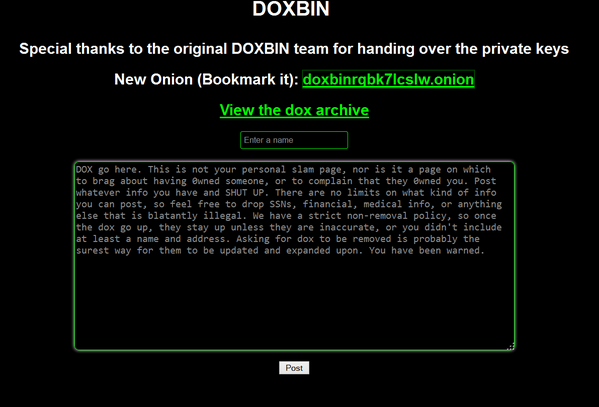The war between authorities and Dark Net website operators seems to be heating up after the announcement today that at least one website, the well-known Doxbin, has been taken back from the control of the US Federal Bureau of Investigation (FBI).
Last week, Federal law enforcement were ecstatic in announcing that along with bringing down the Silk Road 2.0 and arresting its alleged founder they were also able to take control of 27 other “illegal” websites. But their celebration seems to have been a bit premature after the announcement that the records keeping Dark Net site, Doxbin, was back in business; and Cointelegraph verified that it seems to be fully operational, indeed.

Doxbin is one of the more well-known websites on the Dark Net after receiving notoriety last year after it published the name, address and phone number of the judge, Katherine Forrest, who was in charge of handling the first case against the Silk Road 1.0. According to the FBI, this judge received many threats after her personal information was made publically available.
Under the US Cyberstalking law, and many other laws, posting the personal information of another person is a felony. However, Doxbin is not the only website that provides this questionable service. The Encyclopedia Dramática operates in much the same fashion and also allows the posting of photos of potential victims.
The owners of Doxbin were not arrested and have continued to speak out. One of the site owners, #Nashcash Tag, who was reportedly the founder of the site, supposedly turned it over to another hacker named Intangir. After the site was seized by the FBI this week, they released all of their log reports in hopes that someone would be able to identify the vulnerability in their security that allowed the seizure to take place.
But, a few days ago, in a surprising move, the current owners again turned the site over to other hackers who then snatched it back from the authorities and created three Onion addresses, one of which is brand new according to records at ahmia.fi (a Tor search engine). The use of the older addresses appears to be a decoy for police to pursue while the new address is shielded by beefed up security.
Because an Onion address is simply a hash of a private key that is used to control the domain, retaking the site is not a big technical challenge. But now that the new owners have the private key, they will be in a continual back and forth with police for control of the domain and it might be likely that police will tire of the game and will go on the offensive by making arrests.
But retaking control of the site will most likely be temporary if only one Dark Net site is in involved, but if the community comes together, it could present a huge challenge for law enforcement, especially if the ownership of these domains keeps changing hands.
Tor was previously known as the Onion Network because it is composed of 5000 relays that are used to hide the users’ location and usage from network surveillance and prevent investigators from using traffic analysis to locate and snoop.
But this system is far from foolproof. The US National Security Agency, for instance, uses the Firefox browser bundle and a partnership with US telecom providers through a series of programs called Stormbrew, Fairview, Oakstar, and Blarney. Therefore, we could expect the fight for privacy and anonymity to be a long, arduous and drawn-out battle that we will witness for years to come.
Did you enjoy this article? You may also be interested in reading these one:
